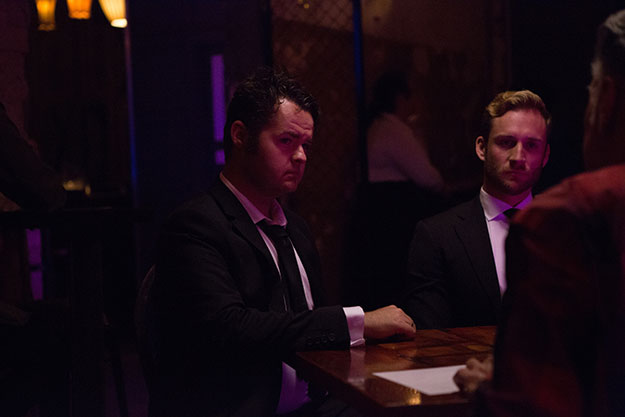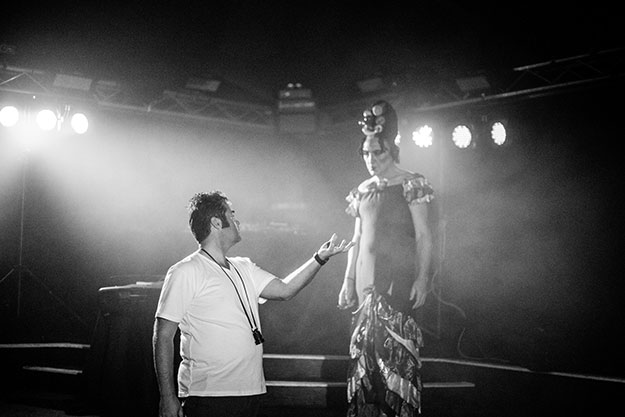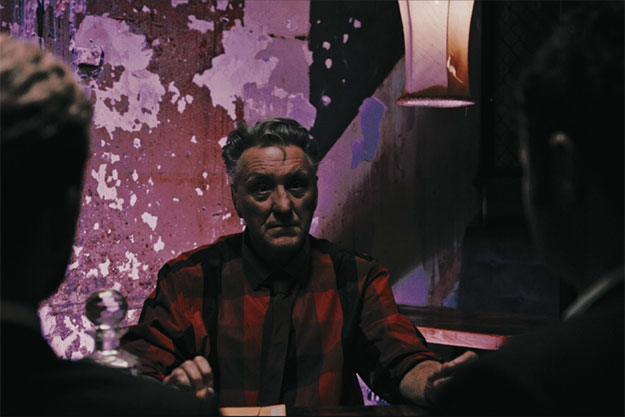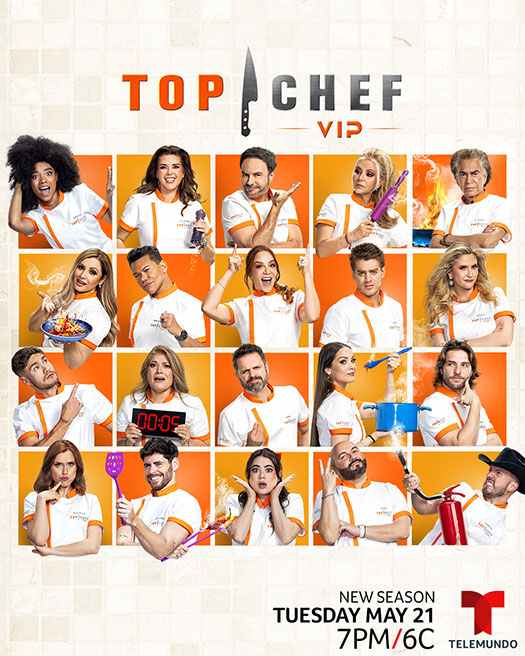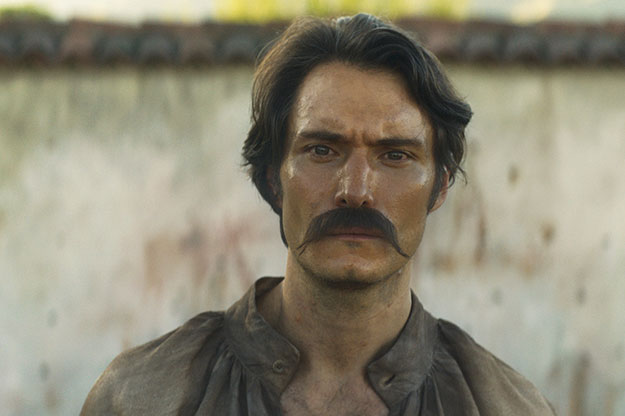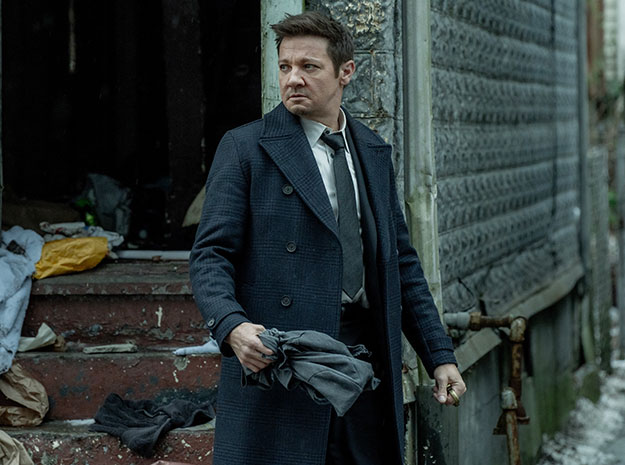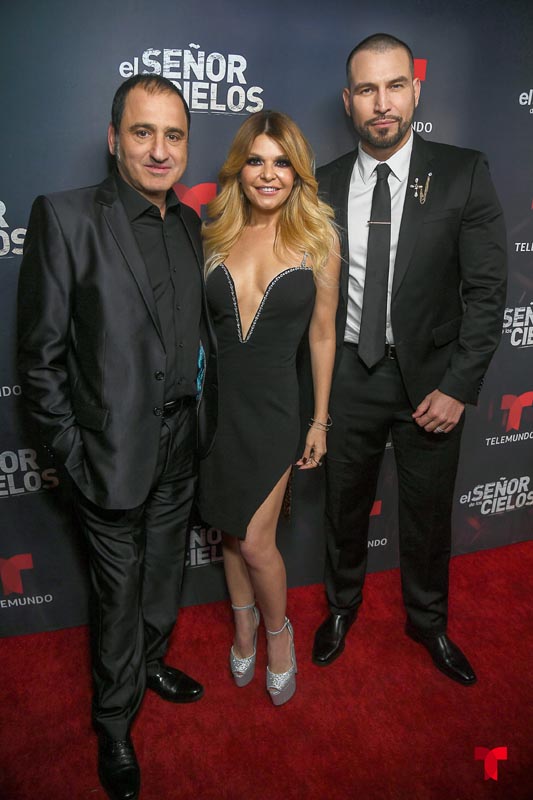Exclusive Q&A: Robert Roworth on ‘That Fella in the Tutti Frutti Hat’
Robert has had a very eclectic career to date, from comedian, voice over artist, impressionist, actor, screenwriter, director to producer. He's starred in leading roles such as Rev. John Hale in Arthur Millers 'The Crucible' to young George Gibbs in Thornton Wilder's classic play 'Our Town', and in multiple characters in Moliere's French Farces as well as on the Sydney production of Shut up & Drive. Robert continues to show versatility and range in a multitude of theatrical disciplines.
Robert is not motivated by one facet of the business we call show, but rather by the entertainment of others. His work from in front of the camera and the boards of the stage has, like many before him, evolved into Screenwriter, Producer & Director. 2016 saw Robert wear many hats, in an Orson Wells style, when he wrote, directed, produced, edited and starred in 'That Fella in the Tutti Frutti Hat' a 15 minute short film about the sinister world of 'Carmen Miranda Tribute' shows and the lengths at which one actor will go to get the ideal part in the ideal show at the ideal venue.
In the last quarter of 2016, a year where the Entertainment industry suffered so many losses, Robert tell us he was locked away in his home office in the beautiful Hunter Valley, wine country in New South Wales, Australia writing his next project, a feature film with a wonderfully long title, a semi modern L.A crime drama - 'The Elusive Mr. Demore: Or How to Get Shiraz out of a White Carpet'. A story that Robert conceived years ago while studying at Drama School in Sydney. We asked him to tell us a bit more about his process in a phone interview.
Question: How did you decided to pursue acting, or did it just find you?
Robert Roworth: It has been a torrid love affair! I fell in love with movies and comedy when I was 5 or6. My mother would take me to the video store and each week I'd pick out 7 or 10 films for the week, from 'Smokey and the Bandit', Top Gun, Days of Thunder, if Chuck Norris, Steven Seagal, Sylvester Stallone, Burt Reynolds were in it... they went in the basket as well. When The Little Mermaid came out on home VHS, my mom bought it for me, I remember sitting around the television, the family all together in the lounge room, when Sebastian the Crab made his entrance and first lines... I turned to them, without batting an eyelid, and mimicked his voice and that was when I got my first laugh, that's when acting found me and I have my family to thank for that. From that point, I switched my viewing habits to include everything, leave nothing unwatched, in a way I was opening myself to the world of entertainment, opening myself to the possibilities and ultimately opening my ears to the varied world around me, which is where I draw my inspirations from, especially when it comes to comedy.
Q: You have had some wonderful opportunities on Stage, it seems that you prefer to do Theatre, what is it about that medium?
RR: The Audience. Whether or not they are aware, they are just as much apart of the show as the crew and the creatives. They have to buy into the world that is existing in front of them, in order for that to work, the actors have to create the world with such specific and intricate detail so that the 'suspension of disbelief' sustains for the performance.
Another thing that I really love about the Theatre is the first steps that you take each night for the first time, and what happens after that, is the journey and the life of the character for better or for worse. Somehow it's different every night, just like life. The first steps we, each of us, take each day, is the start of our journey. Each life has its own examples of routine, but each day, from that first step, even with routine elements, is still different.
Q: Where did the original idea for the story of 'That Fella in the Tutti Frutti Hat' come from?
RR: I've always loved movies that were out to entertain from the start. I grew up taken by Burt Reynolds in Gator, Sharky's Machine, Smokey and the Bandit, Malone... McQueen's Bullit, The Friends of Eddie Coyle, great movies about bad guys and good guys, right and wrong, the fight for injustice and the price that you have to pay for it. So when I sat down to write it as a short, when I was around 18-19, I'd been through Pulp Fiction, Jackie Brown, Get Shorty and I really fell in love with the order in which the story was told, making a jigsaw puzzle of sorts for audience, ostensibly asking the audience to put it together, two things.. pay attention and put it together as we go. So there was the structure. Charismatic bad guys was the second part, guys who make fortunes from criminal acts that we never see them perpetrate, but there is always dialogue to the tune of 'Make sure nothing interferes with the shipment' or 'meet me at the warehouse, we've got a new shipment coming in'... so there was 'Mr. Demore'... and he always 'Eludes' capture, otherwise, he'd be in jail.. so he is 'Elusive', slam them together and you get 'The Elusive Mr. Demore'. I never shot it, it sat there and then one day I said to myself ' Time to get this story out, finance it, shoot it etc'.
Q: How long did it take you to write it?
RR: Nine days. Once I'd completed it, I was overjoyed with the result, I called my agents and said, ok, here we go.. let's get this done. They were very supportive, are very supportive, but they all said the same thing.. 'You haven't directed yet, make something, direct something first, then we'll start on this'. I was a little shocked at such an obvious realisation, I panicked and thought.. for a second.. Eureka! I'll do a short, this was back in early September, Tropfest, an Australian short film festival / competition was coming up, it's a great opportunity to collaborate and make something that has a clear destination, it gives you a deadline to work toward as well which is great in terms of discipline and what have you. The theme for this year, the signature item was a Pineapple, somehow, you just have to use the Pineapple, as long as it's in one shot. Well that was my inspiration, that the Pineapple must all throughout the film.
Q: What was the film, did you shoot it?
RR: I did write it, shot it, went through post and it was completed. It's called 'That Fella in the Tutti Frutti Hat'.. it's about two male Carmen Miranda type performers, one younger the other older. The younger one his name is Paul 'Ineapple (pronounced: IN-UP-OOH-LAY), so that when we see his dressing room, the stars name on the door reads - Mr. P.Ineapple.. Mr. PINEAPPLE, that was one way of getting the Pineapple into the film, the older guy is Curtis J Evans, because that is my cousins name and I wanted to make him infamous... Curtis is not successful at all while Paul is the talk of the town. Curtis decides to hire two hitman, Louis & Martin, to take out Paul. When I came out of Post - Production, it was always my vision to shoot this to look like those crime dramas from the 70's I'm a very big Peter Yates fan and Don Siegal, Charley Varrick was another visual inspiration for this one, so making it cinematic, shooting wide, as wide as possible, letting the moments play, there is only one character with dialogue, he's the exposition while this world turns as it does, anyway, by the time we were out, I realised that I had shot exactly what I wanted, the picture looked amazing to me, the actors were all wonderful in the piece, but... the timecode read 14:03, Tropfest needs it to be 7minutes or under.. I knew instantly that I wasn't cutting it and that it would take another journey.
Q: Indeed another journey, you're here in the United States now, I'm curious, what does an international Actor or Artist go through in coming here to further their career.
RR: One thing I've noticed over the years is that it's very different for each individual wanting to come. Immigration attorney's, paperwork, degrees, letters of recommendation, deal memo's publicity materials, the list seems endless and overwhelming. I think of it like this, and let me say that I'm not an expert on this subject, I have a wonderful attorney that I work closely with. It's like a note from your parents, in this case lots of notes, if it relates to your career as an artist, it's not irrelevant, not at all, the smallest things contribute to the package that you need to put together to have assessed, meeting a specific criteria, in order to satisfy the requirements. That seems obvious, but the danger can be applying to early in your career. If you instantly feel that you can't fill that order, get an outside opinion, then make a decision knowing that like working in the arts, it is a journey of a thousand steps, millions if we're lucky, but you gotta take that first step.
Q: If the Artist doesn't have many that can recommend them, that they feel perhaps are not individuals that carry 'clout', what would your advice be to them?
RR: Come to the United States, whether it's New York or Los Angeles, come, take classes, seminars, get in front of people, let them see the work, if they see the work, chances are they might feel comfortable about writing a letter of recommendation or a character reference on your behalf, you can't get an answer to a question that you don't ask, in the same way you can't get noticed unless you show up to be noticed.
Q: When you talk about classes, for example, you went to Drama School, how do you feel about the training versus untrained battle?
RR: For me, I loved Drama School, loved it, I loved my fellow actors, my mentors, my teachers, my directors, the whole 'jazz' of it! I still take classes even now and there is a difference. In the same way an athlete trains for a major event, Drama school does the same for an actor, you are training your actor muscles so that they are a complete second nature, you don't feel yourself having to look for it, manufacture, when you need it, you just do it without thinking. Classes are like the gym, so you go and workout, stay connected to you actor fitness, I know how it sounds, but personally that's how I looked at training and why I take classes occasionally, to stay connected to the work.
Q: Let's talk about the order of things so to speak. There always seems to be a chicken or the egg factor. In order to get the job, you have to have the visa, but, in order to get the visa you have to have the job. Which is it?
RR: I think it's more of what comes before that. What I mean by that is this. You're O1 Visa is a non- immigrant Visa, so that means that you are basically wanting to work in the USA but you have no immediate intention of moving here. So if you are say... from Australia, my Visa is approved for three years, so for that portion of time, I can come and go as I need / want, in order to work on Stage, Screen etc. The caveat being that I have a substantial body of work that enables me to file for my Visa and go forward from there. In order for that Visa to be approved at the maximum allowable time, I need to prove that I am going to work in that time. Being attached to a project via a deal memo is the way to do this. This is one of the most personal parts of the journey, there is no formula, there is no secret combination that unlocks this vault. The artist has to either, network and get attached, have his or her agent lay a foundation, have a friend of a friend of a friend pull a favour...My general rule of thumb when it comes to doing favours, 'for every favour you ask for, you owe two in return' Firstly to repay the first one, the second you do, can mean that they owe you one.. 'And thus the circle of life'!
Q: What can be some of the do's & don't's of this process, as a whole?
RR: I'd say DO engage an expert in the field, a really great immigration attorney, don't know one? Research... Have the conversation, let them assess whether or not you will qualify, if you don't, you now have structure and a path to follow to make sure that you can. DON'T rush, don't fudge any area of your career, even if you don't think it is good enough, just don't mess with this process. It can be long, it can seem arduous but, when all is said and done, we're talking about your career, your future, so apply as much diligence as you would to your work, after all, for international artists, this is as much a part of their careers as auditioning if for Actors. DO save everything from every show, anytime someone has written about you, interview, blog, taken your picture and published it to a website, any publicity, keep! You'll need it. Keep your eye on the prize, remember what drives you to succeed, your motivations, be honest with yourself and be honest with where you are in your career. Visas are expensive.
Q: When you say expensive is that due to needing an immigration attorney? What are your thoughts on having an attorney versus not having one?
RR: Well, I can't speak for the latter, I have an attorney, I never thought about filing without one, the Visa landscape appears, and I'm sure this is the case, very complex, very involved and very specific. I succumb to experts, that's their domain. My job is to entertain, I've studied hard, worked even harder to do so, they've put in just as much, if not, more effort in order to practice in this very detailed area of law. I guess the easiest example would be, who do you want operating on you? Surgeon or a Butcher?
Q: What are you currently working on, what's next for you?
RR: Well, I am returning to Sydney at the end of April to start working on the next chapter to 'Tutti Frutti Hat', I'd had this idea that I'd like to do two more, almost like an opera of sorts, the next one is titled 'Shiraz on a White Pillow' (approx 25minutes) and it's how these characters started, in a sense, an origins story and the third one i've yet to write but it will be an all out revenge / honour bound film, (30minutes) as 'Hong Kong Cinema' as I can make it, when they are all done, I'll have a feature film in three movements, which is something that, creatively speaking, excites me. After that I'm doing a feature film in Sydney in September called 'SLAM' Directed by a wonderfully talented and very intelligent man Partho Sen-Gupta, the film deals with a lot of what society is going through now in terms of Islamaphobia, terrorism, freedoms and liberties that we may or may not have become complacent about. After that I come back to the USA to start a Juvenile Corrections documentary film on the east coast, then upstate New York to do a Romantic Drama. So it is certainly a busy time, creative and busy.


